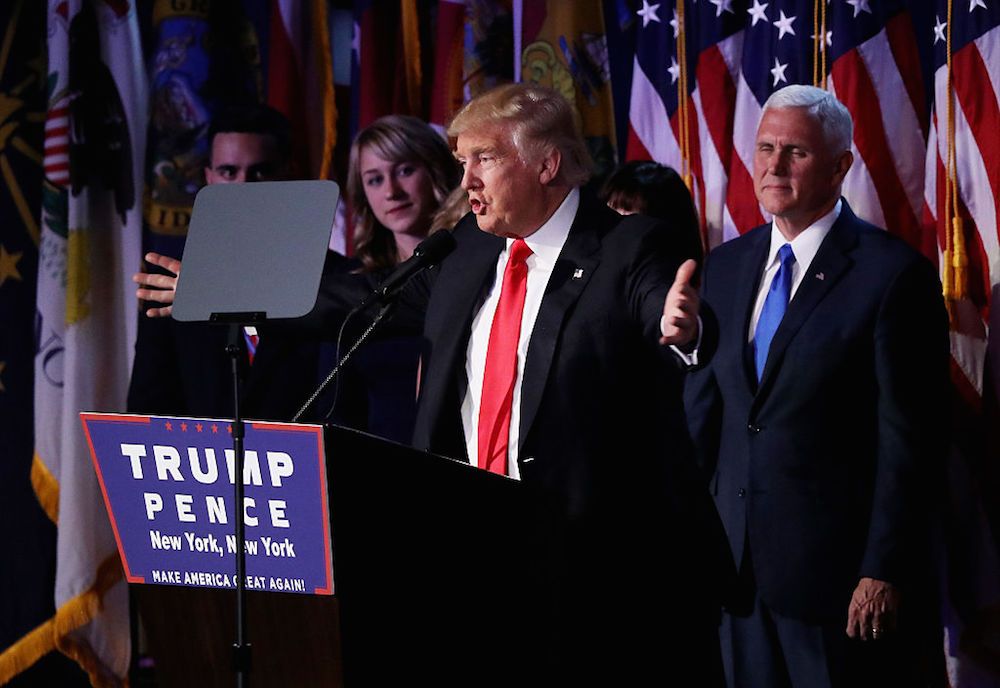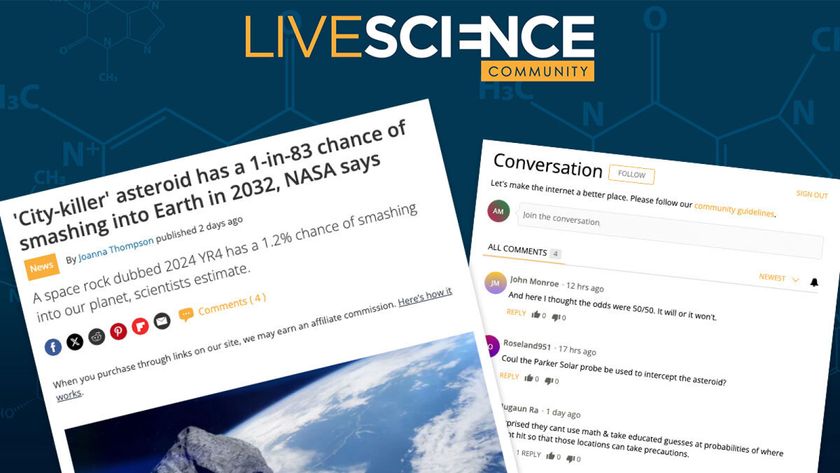What Will a Trump Presidency Mean for Science?

President-elect Donald Trump is likely to affect science when he comes into office next year, with the potential to change everything from climate change action and the Keystone pipeline to sex education and fetal tissue research.
Trump wrote that "Science is science, and facts are facts" in a September interview with ScienceDebate, a coalition of 56 U.S. nonpartisan scientific organizations.
But some of Trump's statements are at odds with science. For instance, there is no real evidence that vaccines cause autism, but in 2014, Trump made a series of tweets and statements saying that the two were linked, according to Business Insider.
Moreover, 97 percent of scientists attribute climate change to the effects of human activity, but in a 2012 tweet, Trump said global warming was a concept "created by, and for, the Chinese in order to make U.S. manufacturing noncompetitive."
To learn more about where Trump stands on hot-button scientific issues, Live Science examined the Republican platform and Trump's statements, as well as his answers from the interview with ScienceDebate. [What Are the Different Types of Government?]
Coal
At the second presidential debate, Trump said that coal will last for 1,000 years in the U.S., while his party has called the resource "an abundant, clean, affordable [and] reliable domestic energy resource."
Coal is relatively inexpensive, but it's neither clean nor vastly abundant within the United States, experts have told Live Science. When coal is burned for energy, it release pollutants, such as carbon dioxide, a greenhouse gas linked to climate change, and sulfur dioxide and nitrogen oxide, which are linked to acid rain, Edward Rubin, a professor of engineering, public policy and mechanical engineering at Carnegie Mellon University in Pittsburgh, told Live Science in October.
Sign up for the Live Science daily newsletter now
Get the world’s most fascinating discoveries delivered straight to your inbox.
Clean coal technology may one day capture these pollutants before they enter the atmosphere, but "Clean coal does not currently exist" in any operational U.S. coal plant, Mary Finley-Brook, an associate professor of geography, environmental studies and international studies at the University of Richmond in Virginia, told Live Science in October.
If the country continues to use coal at its current rate, reserves would last another 100 to 250 years, according to a 2007 report from the National Academy of Science, not 1,000 as Trump said.
However, in the ScienceDebate interview, Trump added that more than coal is needed to support U.S. energy needs: "Energy independence means exploring and developing every possible energy source, including wind, solar, nuclear and biofuels," he wrote.
Abstinence-only sexual education
Teenagers should learn about sexual "abstinence until marriage" rather than about "family planning" programs, the Republican National Committee (RNC) wrote in its platform. However, abstinence-only sex education does not significantly prevent teen sex, studies have found. For instance, a 2008 study published in the Journal of Adolescent Health found that teens enrolled in abstinence-only sex education class were just as likely to have intercourse and become pregnant as teens who received no sex education, Live Science reported in July 2016.
In contrast, teens who learned about effective birth control from comprehensive sexual education programs were less likely to become pregnant than those who didn't receive this education, the study found.
Birth control may explain why there was a 25 percent decline in the teenage pregnancy rate from 2007, when there were 70 pregnancies per 1,000 teenage women and girls, to 2011, when there were 52 pregnancies per 1,000 teenage women and girls, the researchers of a 2016 study published in the Journal of Adolescent Health found. [The List: Teen Pregnancy Rates by State]
Teenage women and girls surveyed in 2007 were just as likely to be sexually active as another group of teenage women and girls surveyed in 2012. However, the latter group was less likely to get pregnant, because they had access to effective birth-control methods, such as pills and intrauterine devices (IUDs), rather than less effective measures, such as condoms, the researchers of the 2016 study found. [Birth Control Quiz: Test Your Knowledge]
Keystone XL pipeline
Trump has signaled that he would work with TransCanada, the company seeking to build the Keystone XL oil pipeline to carry crude oil from the oil sands region in Canada to refineries in the United States.
In a 2016 campaign speech in Iowa, Trump said he would support the company if it reapplied for a border-crossing permit, and that he would pursue "25 percent of the profits, forever," according to Canada's Business News Network. On Wednesday (Nov. 9), TransCanada spokesman Mark Cooper responded, saying, "TransCanada remains fully committed to building Keystone XL," Politico reported.
Farmers, ranchers and environmentalists have rallied against the pipeline, whose contents — oil sands' crude oil — emit 17 percent more carbon dioxide than the average barrel of crude oil, according to the U.S. State Department, as reported by CNN. And in November 2015, President Barack Obama rejected the pipeline's construction, according to the Albuquerque Journal.
If the pipeline were built and run at full capacity, it could release greenhouse gases every year that would be the equivalent of the annual output of 5.7 million cars on the road, or almost eight coal-fired power plants, according to a 2015 study by the Environmental Protection Agency (EPA), the Los Angeles Times reported.
Endangered Species Act
The Endangered Species Act (ESA) is designed to protect threatened and endangered plants and animals in their native habitats, according to the EPA.
In the ScienceDebatequestion about protecting biodiversity, Trump did not name the EPA specifically, but said that certain federal government agencies are filled with unelected officials who make regulations based on special-interest input. In his administration, these decisions would be passed down to state and local governments, Trump wrote.
Furthermore, laws to protect animal and plant species would be "modified to balance the needs of society with the preservation of our valuable living resources," he wrote.
Perhaps an example of Trump's beliefs lies with the gray wolf (Canis lupus), a keystone predator. The RNC platform noted that the ESA " not include species such as gray wolves and other species if these species exist elsewhere in healthy numbers in another state or country," as these protections could hurt a region's economic viability. [In Photos: The Fight Over Gray Wolves' Endangered Status]
The gray wolf is not endangered worldwide, but most populations of the wolf are endangered within the United States, according to the U.S. Fish and Wildlife Service.
However, the loss of any local population hurts biodiversity and the ecosystems within each area, Jennifer Hughes, lead author of a 1997 study on local population loss in the journal Science, said in a 1997 statement.
Abortion
Trump and the Republican National Committee have been vocally pro-choice, but in the third and final presidential debate, Trump came out strongly against late-term abortions, comparing them to "ripping" babies from wombs. During the debate, Trump countered Hillary Clinton's position, saying: "Because based on what she is saying and based on where she's going and where she's been, you can take baby and rip the baby out of the womb. In the ninth month. On the final day. That's not acceptable."
Trump was likely referring to cases of "late-term abortion," not a medical term but used generally for abortions that are performed toward the end of a pregnancy. However, abortion after the 20th week of pregnancy is very rare — only 1.3 percent of abortions occur at the 21st week or later, according to the Guttmacher Institute, a reproductive health research organization.
Elizabeth Nash, the senior state issues manager at the Guttmacher Institute, previously told Live Science that most states have laws restricting abortions at some point in pregnancy. There are "very limited circumstances where a woman would be able to obtain an abortion" after the time point specified by state laws, Nash said. More than a dozen states already prohibit abortion after 20 weeks, but Trump could call on Congress to enact a federal rule to this effect. [8 Supreme Court Decisions that Changed US Families]
The president-elect could also try to strike down laws that provide basic health and safety standards in abortion clinics, including the Supreme Court's recent decision in Whole Woman's Health et al. v. Hellerstedt.
In that decision, the Supreme Court overturned a Texas bill that required doctors who perform abortions to have admitting privileges at a nearby hospital. The majority opinion said that these requirements did not offer medical benefits to the patients. Less than 1 percent of U.S. women who have an abortion will require admission to a hospital due to a major complication, and according to the American Congress of Obstetricians and Gynecologists (ACOG), "abortion is one of the safest medical procedures performed in the United States."
Given that there is currently an open seat in the Supreme Court, under Trump's administration, the vacancy will likely be filled by a staunchly conservative judge. This may mean that access to abortions, in general, could be threatened. The historic decision in Roe v. Wade, which protected a woman's right to have an abortion, has been threatened in cases that have been tried in the lower courts, but no case has reached the Supreme Court so far. If an anti-abortion case were to make it to the highest court, Roe v. Wade could be overturned by a conservative-leaning bench.
Climate Change
The president-elect said that "the concept of global warming was created by and for the Chinese in order to make U.S. manufacturing non-competitive," according to a tweet posted by Trump in November 2012.
Speaking about climate change in response to a slew of science-related questions posed by ScienceDebate (a coalition of scientists that called on the candidates to give their stance on top science issues), Trump referred to the issue in quotation marks. He added that, "There is still much that needs to be investigated in the field." [Read more: How Trump Could Erase Decades of Climate Change Action]
Scientists agree that climate change's effects are already being seen around the world, and that human activities have been the dominant cause of the observed warming. In fact, 2016 is on track to be the hottest year on record, according to NASA. Continued warming of the planet will cause ice sheets to melt, global sea levels to rise and ecosystems to become endangered, in addition to other devastating effects across the globe, scientists warn.
Despite a consensus from the scientific community and their warning about the real dangers of global warming, Trump has selected Myron Ebell, a well-known climate change skeptic, to lead the transition of the Environmental Protection Agency to the new administration, reported ClimateWire. Ebell, director of the Center for Energy and Environment at the conservative Competitive Enterprise Institute, is known for calling climate change "alarmism" and questioning scientific consensus on the issue.
Trump has also said that he would renege on the historic Paris climate pact. President Barack Obama, along with 195 other countries, agreed to cut carbon dioxide emissions to prevent more than a 3.6-degree Fahrenheit (2 degrees Celsius) rise in global average temperatures above preindustrial levels.
During a speech on energy policy in North Dakota in May, Trump attacked the Obama administration's climate work and said that he would "cancel the Paris Climate Agreement and stop all payments of U.S. tax dollars to U.N. global warming programs." While there are ways the president-elect could derail the agreement's mission, the pact specifies that signatories can remove themselves from the treaty only after four years.
LGBTQ
In his speech accepting the Republican Party's presidential nomination, Trump called for the need to protect the LGBTQ community. "As your president, I will do everything in my power to protect our LGBTQ citizens from the violence and oppression of a hateful foreign ideology," Trump said at the 2016 Republican National Convention in Cleveland. Trump also specifically mentioned the massacre in Orlando, in which a gunman killed 49 people after he opened fire at a gay nightclub in June.
But despite his promise to protect LGBTQ Americans, in an interview with Fox News in January, Trump said that he would "strongly consider" appointing judges to overturn the Supreme Court's landmark 2015 decision in Obergefell v. Hodges that legalized same-sex marriage.
Trump has also made conflicting statements on transgender rights. On the "Today Show" in April, Trump was asked about the North Carolina bathroom law that bans transgender people from using bathrooms that align with their gender identity.
"People go, they use the bathroom that they feel is appropriate," Trump said on the "Today Show." "There has been so little trouble." He added that he would be fine with Caitlyn Jenner visiting Trump Tower and using any bathroom she chooses. He added that he is against the creation of new bathrooms for transgender people, and that bathrooms should be left as they are.
However, he later changed his stance, and in an interview with The News & Observer in July, he said he was "going with the state," in reference to North Carolina.
"The state, they know what's going on, they see what's happening and generally speaking I'm with the state on things like this," he said. "I've spoken with your governor, I've spoken with a lot of people and I'm going with the state."
Original article on Live Science.

Laura is the archaeology and Life's Little Mysteries editor at Live Science. She also reports on general science, including paleontology. Her work has appeared in The New York Times, Scholastic, Popular Science and Spectrum, a site on autism research. She has won multiple awards from the Society of Professional Journalists and the Washington Newspaper Publishers Association for her reporting at a weekly newspaper near Seattle. Laura holds a bachelor's degree in English literature and psychology from Washington University in St. Louis and a master's degree in science writing from NYU.
Most Popular





